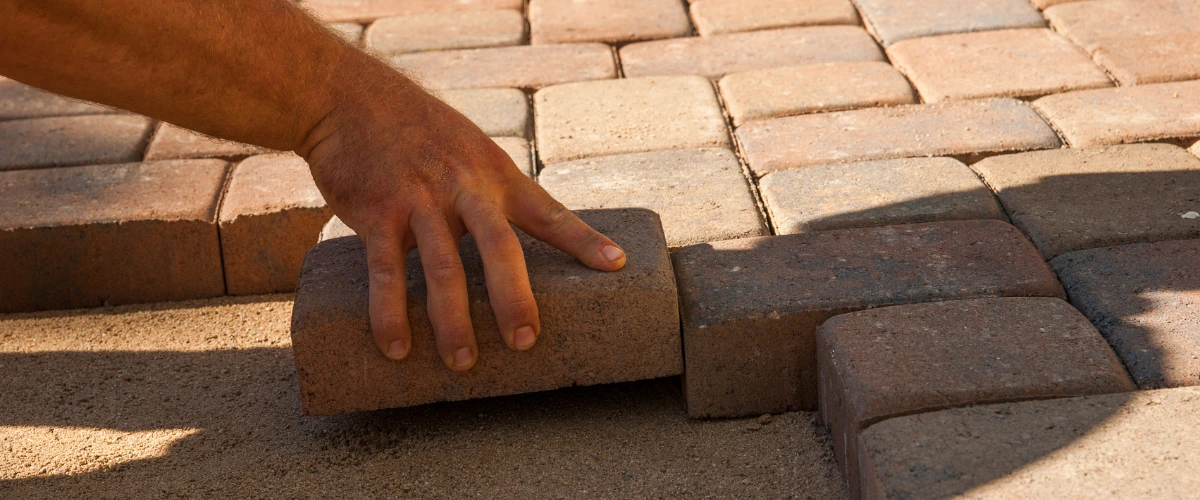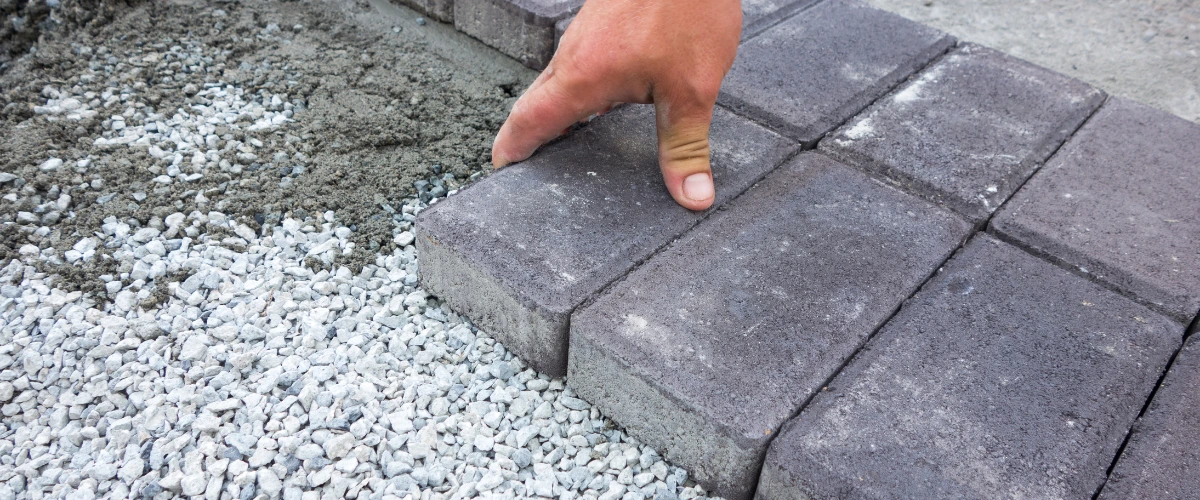Best Material For Walking Path
Choosing the right material for a walking path can be tricky. Many options exist, from gravel paths to concrete pavers. Our guide will show you the best materials based on durability, maintenance, and beauty.
Keep reading to find your perfect garden path solution.
Key Takeaways
- Gravel is a very versatile material for garden paths. You can buy it in bulk quantities, which makes it easy to cover large areas without spending a lot of money. It fits well in many garden styles and stands up to foot traffic.
- Mulch is a popular choice for garden paths. It's natural and blends well with the environment. People often use wood chips or shredded bark. These materials are soft under bare feet.
- Pavers or bricks are great for a garden path. They offer a classic look that fits many home styles. You can choose from many colors and shapes to match your outdoor space. Paver or brick paths last long and handle foot traffic well.
- Natural stepping stones are a charming and practical choice for creating pathways in your garden. These raw stone materials create lovely textured surfaces that blend seamlessly with your landscaping.

Overview of Pavers and Concrete for Pool Decks
When choosing materials for a walking path, it’s crucial to consider factors such as foot traffic, maintenance requirements, aesthetic appeal, and cost. Various options like gravel, mulch, pavers/bricks, natural stepping stones or wood planks offer different benefits for creating a durable and visually pleasing pathway in your garden or yard.
Each material performs differently based on these factors and homeowners typically opt for tried and true materials like poured concrete or flagstone for their durability.
Gravel
Gravel is a very versatile material for garden paths. You can buy it in bulk quantities, which makes it easy to cover large areas without spending a lot of money. It fits well in many garden styles and stands up to foot traffic.
The small stones allow water to drain quickly, so paths dry fast after rain.
People often choose gravel because it has very few maintenance requirements. Over time, you might need to add more gravel as it sinks into the ground or moves from people walking on it.
But overall, keeping a gravel path looking good is straightforward and low-cost.
Gravel paths can direct foot traffic while adding a natural touch to your garden landscape.

Mulch
Mulch is a popular choice for garden paths. It’s natural and blends well with the environment. People often use wood chips or shredded bark. These materials are soft under bare feet.
They also help keep weeds down and moisture in the soil. You can buy mulch in bulk quantities, which saves money.
To make a mulch path, you lay out the shape with a garden hose. Then you clear the area of grass and weeds. Next, put down landscape fabric to stop more weeds from growing. Finally, spread the mulch over this fabric.
This kind of path needs some care each year to stay nice-looking.
Pavers/Bricks
Pavers or bricks are great for a garden path. They offer a classic look that fits many home styles. You can choose from many colors and shapes to match your outdoor space. Paver or brick paths last long and handle foot traffic well.
They need some upkeep to keep weeds at bay but less than other materials like mulch.
Natural Stepping Stones
Natural stepping stones are a charming and practical choice for creating pathways in your garden. These raw stone materials create lovely textured surfaces that blend seamlessly with your landscaping.
Homeowners commonly purchase them in bulk quantities, making them an affordable option for incorporating into garden walkways and flower beds. Stepping stone paths not only add aesthetic appeal but also offer a functional solution to navigate through the garden while preventing weeds from growing around flower beds.
Stepping stones are typically purchased by square foot slate chips or rolled mats, as well as other natural options such as cypress bark and recycled rubber tiles from landscape supply specialists or local home improvement stores.
Using natural stepping stones creates a beautiful garden pathway, enhancing the overall look of your backyard garden designs. As we move on to discussing “Wood Planks,” let’s explore another interesting material option for durable walking paths.
Wood Planks
Wood planks can be a charming and natural choice for a garden path. They often blend well with the landscape, providing an inviting and rustic feel to your outdoor space. Treated wood planks are resistant to deterioration, making them durable against weather exposure and foot traffic.
When maintained properly, they can last for several years, offering an affordable and DIY-friendly option for homeowners seeking a traditional look for their walking path.
Factors to Consider When Choosing Materials
Foot Traffic
Foot traffic is the amount of people walking on a path. Different materials handle foot traffic differently. For instance, poured concrete and asphalt can endure heavy foot traffic, making them suitable for high-traffic areas.
On the other hand, natural stepping stones and wood planks are better for lighter foot traffic in garden pathways. Consider how much foot traffic your walking path will get to choose the right material.
The durability of your chosen material directly impacts how well it can hold up against frequent use. Poured concrete and flagstone are durable options that require minimal maintenance despite heavy foot traffic, while recycled rubber tiles offer an eco-friendly alternative with moderate durability.
When selecting materials for your walking path, ensure they align with the anticipated level of foot traffic to maintain functionality over time.
Maintenance Requirements
Maintenance for a walking path depends on the material used. Gravel paths need periodic raking and topping up to maintain a level surface, and mulch paths require replenishing to avoid compacting.
Pavers or bricks may shift over time with heavy use, requiring occasional realignment.
Natural stepping stones can become loose and uneven, needing regular adjustment. Wood planks may warp due to weather conditions, necessitating replacement or repair.
Maintenance for durable walking paths like poured concrete involves sealing every few years to protect against cracking and staining, while flagstone requires weeding between the stones.
Asphalt needs resealing every few years to prevent cracking under UV sun exposure. To keep eco-friendly materials like recycled rubber tiles in good condition, regular cleaning is crucial.
Proper maintenance ensures your pathway remains safe and appealing for foot traffic.
Aesthetic Appeal
The aesthetic appeal of a walking path material is essential for enhancing your garden’s visual charm. Natural materials like flagstone and crushed stone can give a rustic and earthy look, blending seamlessly with flower or garden beds.
For homeowners seeking more DIY-friendly materials, wood pathways offer a warm and inviting feel while also being visually appealing. A well-installed concrete path provides a clean and modern look for those wanting a sleeker appearance in their garden.
When choosing the material, consider its ability to complement your existing landscaping and the overall design of your outdoor space. The right choice can elevate the beauty of your garden while providing functionality for upcoming projects.
Cost
When selecting materials for your walking path, cost is a crucial consideration. Gravel and crushed stone are cost-effective options for a durable pathway. Conversely, natural stepping stones and flagstone may come with a higher price tag but provide a more visually appealing appearance.
Also, remember to take into account the maintenance costs; while some materials like poured concrete demand less upkeep, others such as wood planks may require regular care.

Popular Materials for Durable Walking Paths
Poured Concrete
Poured concrete offers durability and requires minimal maintenance for walking paths. Homeowners usually buy it in bulk, calculating costs per square foot or cubic yard. A well-installed concrete path necessitates thorough base preparation to ensure long-lasting stability.
Commonly chosen for larger walkways, concrete withstands foot traffic and weather conditions. Ensuring the concrete surface remains tidy necessitates regular maintenance.
Flagstone, a popular option, is recognized for its natural appeal and resilience, but it demands careful installation due to its irregular shapes.
Flagstone
Flagstone is a popular choice for durable and visually appealing walking paths. It offers a natural, rustic look that enhances the aesthetic appeal of your garden while providing a sturdy surface for foot traffic.
Homeowners commonly choose flagstone because it performs well in various climates and requires minimal maintenance to keep its charm intact. Considering cost, it’s important to highlight that flagstone may have a higher initial cost than some other materials, but its longevity can make it a cost-effective option in the long run.
Moreover, homeowners appreciate that flagstone comes in various shapes and sizes, allowing for creative designs to suit individual preferences. Besides, its durability makes it suitable for heavy foot traffic areas such as designated garden paths or walkways through well-maintained grass.
In addition, when properly installed with careful care and attention to detail by incorporating proper base preparation techniques, homeowners find themselves initiating successful DIY projects using this material commonly found among sought-after garden path ideas.
Asphalt
Asphalt is a popular choice for durable walking paths due to its cost-effectiveness and longevity. It typically costs around $3 to $5 per square foot, making it an affordable option for homeowners seeking to create a robust and dependable pathway.
Asphalt also requires minimal maintenance, mainly occasional resealing every 3-5 years, reducing the need for ongoing upkeep. Moreover, asphalt creates a smooth surface that is easy to walk on and is ideal for high foot traffic areas due to its durability and ability to withstand heavy loads without breaking down easily.
When considering materials for your walking path, consider asphalt as an economical and low-maintenance solution that can provide long-term functionality while remaining budget-friendly.

Best Manufacturers of Walking Path Materials
When selecting materials for your walking path, choosing a reputable manufacturer ensures quality and durability for your project.
- Trex Company: Known for their eco-friendly composite decking materials, providing sustainable solutions for outdoor pathways with enhanced longevity.
- Belgard: Offers a variety of durable paving stone options, blending aesthetic appeal with functionality for residential and commercial paths.
- Unilock: Specializes in innovative concrete pavers, delivering high-traffic strength and a diverse range of styles and finishes.
- Oldcastle: Provides a wide selection of hardscape products, focusing on robust construction and versatile design options for pathways.
- Lowe’s: Features accessible DIY materials, offering quality and affordability for homeowners looking to create custom walking paths.
Best Material for Walking Path - FAQs
Experienced Professionals You Can Trust
Our team of seasoned professionals has been expertly crafting walking paths for years. Choosing the best ensures exceptional results that save you money over time. If you’re from Colorado and you’re ready to tackle your paver patio installation project with our industry experts, contact us at (720) 580-3677 to get started.
